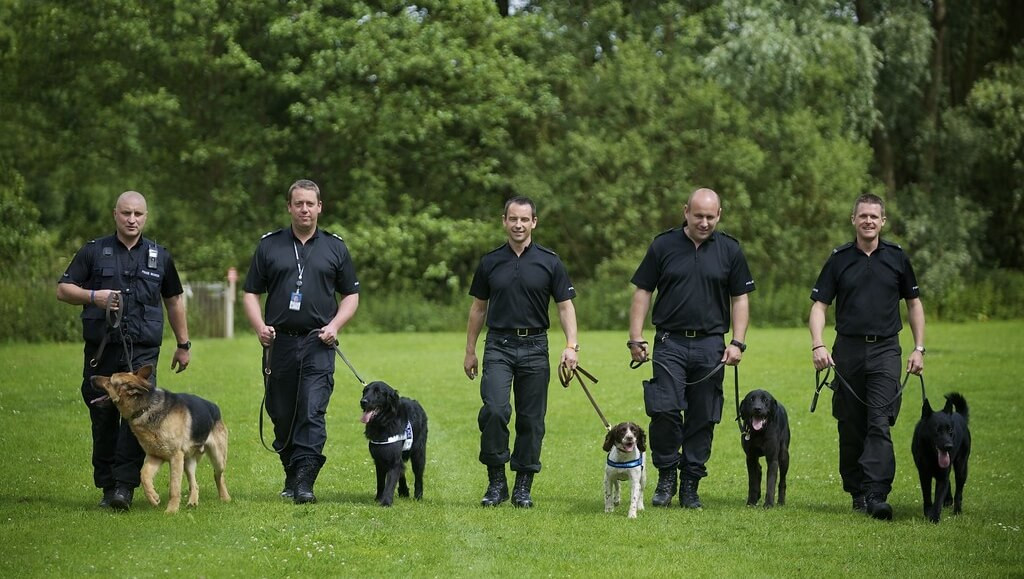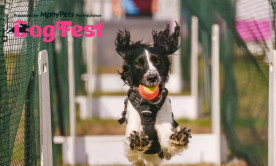There are around 2,500 police service dogs operating within police forces across the UK, half of which are in the General Purpose Dog Unit.
General Purpose Police Dogs are multi-disciplined canines who are trained to undertake a wide range of skills, including:
- Tracking suspects
- Missing person searches
- Finding and recovering evidence
- Public order and patrols
- Aid in controlling dangerous dogs
- Protect the handler in dangerous situations and discourage threatening behaviour
Having these dogs trained in such a board manner makes them a highly valuable addition to territorial police forces across the UK.
While English Cocker Spaniels, Springer Spaniel and Labradors are used for more specialist roles like bomb and firearm detection, German Shepherd Dogs or Belgian Malinois are the two common breeds used in the general purpose unit.
Early training
Dogs who work with the police dog unit are sometimes donated and some police forces have their own dog breeding units.
From seven weeks old, police dog puppies stay with volunteer ‘Puppy Walker’ families and live in their homes for up to twelve months. Puppy Walkers are responsible for day to day care, exercise and general wellbeing. By having future police dogs live within a family environment means the puppy is used to being around people, other animals, and different environments.
Command and lighter training disciplines are undertaken through puppy development schemes at a local Police Dog Training School. This is to access if the puppy has what it takes to undertake a full Police Dog training course. Qualities an assessor is looking for include:
- boldness
- agility
- stamina
- willingness and determination
- intelligence
- mental toughness
Puppies that do not meet the grade are put up for adoption and often go back to live with their original puppy walker.
Full Training
From around 12-18 months of age the dog can begin their full Police Dog training course. A more rigorous four week assessment programme measures if the dog is capable enough to become a full service dog within a police unit. If the dog passes the assessment, it is matched with an officer who they will live with for the rest of their working life.
Training is undertaken over a challenging 13 week course which focuses on safety, control, and efficiency. The handler will be introduced to their dog for the first time at the start of the course and quickly build up a bond. Working closely with their handler, the dog learns:
- tracking
- biting
- chasing and take downs
- building searching and finding illegal items
- general focus control to maintain discipline in a range situations they’ll encounter on active duty
Training is catered to each dog where their strengths and weaknesses are identified so they it can be improved. The dogs are also encouraged to use their instincts in a controlled way and on command.
If a dog passes the 13 week course, they are given a licence from the Home Office which means they can work as a police dog. But the training never stops. Every month, two full training days are dedicated to honing and expanding the dog’s and handler’s skills. And every six months a week long refresher course must be undertaken.
Police dogs are constantly rewarded for good, hard work. During training they receive good food, care, exercise and protection.
Dog handlers
A high level of training is required of police dog handlers to create a strong bond with their dogs and ensure the dog is happy, healthy and can do their duty effectively. Handlers must know basic veterinary practices and understand canine psychology to be able to judge the dog’s body langue and mannerisms.
A handler must live with their dog and have a purpose built kennel constructed in their garden where the dog must be kept. This helps the dogs adapt to their working life, where they are outdoors for long periods.
Retirement
By age 7 or 8, and sometimes up to 10 years old, General Purpose Police dogs retire. Most retired police dogs remain with their handler and become a family pet, even if the handler acquires another working police dog.
If the handler is unable to look after the dog it is placed in a caring home. Organisations like the London Retired Police Dogs Trust help find suitable homes.
Sadly retired police dogs do not receive any financial support from their police force and all vet bills fall solely to the owner. Due the nature of the dog’s old working life they are unable to require pet insurance which can leave the owner with very expensive bills to pay. But there are charities that help.
The Thin Blue Paw Foundation aims to “protect, celebrate and rehabilitate both serving and retired police dogs from across the United Kingdom.” For more information see their website: https://www.thinbluepaw.org.uk/
Header image credit: West Midlands Police





